Showing 1-20 of 34 results
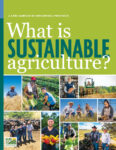
New SARE Bulletin: What is Sustainable Agriculture?
SARE’s newly revised What is Sustainable Agriculture? publication provides a primer to practices that can help farmers and ranchers improve the sustainability of any complex, integrated production and marketing system.

What is Sustainable Agriculture?
This award-winning report provides a sampler of best practices in sustainable agriculture—from marketing and community vitality to cover crops and grazing—as well as eight profiles of producers, educators and researchers who have successfully implemented them.
Northeast Farm Energy IQ
Farm Energy IQ offers free information to help farmers enhance operational sustainability in the context of the farm economy and ecosystem.
Climate Change and Sustainable Agriculture: Curriculum and Handbook
To help educate farmers and agricultural professionals on climate change and agriculture topics, Julie Doll and a team of researchers at the Kellogg Biological Station have developed a handbook and a curriculum as products of a NCR-SARE Professional Development Program grant.

Climate-Sustaining Agriculture
Often, farmers are willing to make changes in their growing practices to reduce their greenhouse gas (GHG) emissions and their climate impact. Whether conventional or organic, agriculture can be a source of GHG emissions. Those farmers eager to modify their practices may lack the knowledge and tools to make effective choices. According to graduate student […]
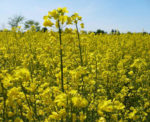
Sustainable Production and Use of On-Farm Energy
Using solar or wind energy or producing biofuels from crop feedstocks and anaerobic digestion helps farmers achieve energy independence while improving profitability and reducing fossil fuel emissions.

Integrating Traditional Foods with Aquaponics in the Desert Southwest
The Challenge Cochise County, Arizona, where Aaron Cardona’s Arevalos Farm is located, is classified by the USDA as a food desert with high poverty rates, as well as high rates of diabetes and obesity. To help confront these problems, Cardona decided to look into aquaponics, which had not been experimented with in the desert regions […]
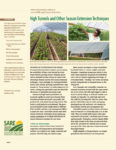
High Tunnels and Other Season Extension Techniques
From low covers to high tunnels, from hoop houses to greenhouses—producers are finding ever more innovative ways to extend the growing season, and their income stream.
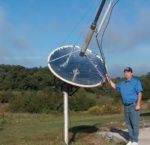
From Fruit to Fuel
As tree fruit growers know well, annual harvests do not remove all the fruit from the orchard. A great deal is left behind littering the orchard floor. While pondering his fruit waste problem, Dan West of Macon, Mo., who grows apples, peaches, apricots, nectarines, plums and pears, hit upon a novel approach: Why not turn […]

The Sustainability of Biofuel Fact Sheet Series
This 18-part series addresses topics related to the sustainability of biofuel production, including biodiversity, greenhouse gas reductions, life cycle analysis and more.
¿Qué es la Agricultura Sustentable?
Qué puede haver para que su finca o rancho sea más sustentable? No hay una respuesta simple, pero la serie de animación de 8 episodios de SARE "Qué es la agricultura sostenible" destaca algunas prácticas comunes usadas por productores en todo el país para mejorar la rentabilidad, calidad de vida y el manejo ambiental.
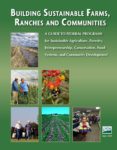
Building Sustainable Farms, Ranches and Communities
This guide lists funding opportunities offered by federal programs, and is indispensable for anyone seeking government help to foster their innovative enterprise in forestry and agriculture.
Exploring Energy Efficiency and Alternatives Curriculum
According to Sarah Hamlen, Montana State University Extension, and Milton Grieger, University of Wyoming Extension, Western producers’ profitability is closely linked to the consumption and production of energy resources. Decisions made by these producers on energy issues have long-term implications for the sustainability of agricultural production, they assert. To increase producers’ knowledge of energy issues, […]
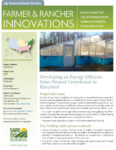
Developing an Energy Efficient, Solar-Heated Greenhouse in Maryland
This project investigated the effectiveness of energy-efficient greenhouse design and the ability of water-heating solar panels to heat a greenhouse as a propane alternative.
Sustainable Renewable Energy Training for Agriculture and Natural Resource Professionals
The multiple benefits that a sustainable bioenergy system can provide underscore the need for its development in a manner that assures that the expansion of this sector provides not just new energy but broader environmental and community benefits as well (Kleinschmit, 2007; Jordan et al, 2007; Kleinschmit and Muller, 2005). It will require that farmers […]
Educational Curricula and Professional Development Training for Energy Efficient Production Practices
In response to the shift in some crop acres from providing food and fiber to an increased emphasis in energy farming, concerns have been raised about potential problems from crop monocultures or high rates of residue removal. David Clay’s long-term goals for his project were to increase producers’ awareness of the importance of determining costs […]
Impact of Biomass Removal for Bioenergy
The rapid increase in ethanol production from corn rain, and the proposed use of crop residues for ethanol production poses significant challenges in increasing awareness and providing needed training to extension educators and agency staff to address the potential environmental impacts of intensive corn production and corn residue use. Mahdi Al-Kaisi conducted an educational training […]
Greenhouse Energy Conservation Strategies and Alternative Fuels
Many greenhouse growers are looking for options to reduce their energy costs, but they don’t always understand which options will provide the greatest return on investment. For his project, Scott Sanford developed curriculum materials, extension bulletins, resource lists, and a spreadsheet model for educators to use for delivering programming on energy management and conservation for […]
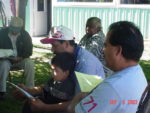
Biofuels and Community Participation
Extension and other natural resource educators can provide educational programming on renewable energy and potential impacts at the community level, and can be facilitators of community discussions about renewable energy. Sharon Lezberg provided training materials to approximately 100 extension, NRCS educators, and community stakeholders on ways to engage community members and stakeholders in assessing proposed bioenergy developments. The toolkit Lezburg developed provides a decision-making […]
Integrated Alternative Energy and Livestock Production Systems
Agricultural production capacity, as well as transportation, storage, and marketing infrastructure for alternative biomass feedstocks and other renewable energy sources often presents challenges. In some cases, farmers and ranchers can find themselves at a disadvantage, operating in a knowledge vacuum as they encounter developers moving to position themselves for future energy development. Michael Siepel’s project […]